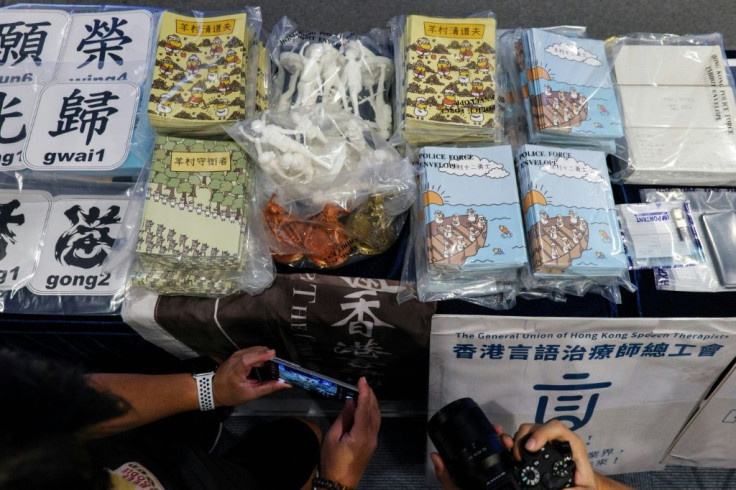Hong Kongers Arrested For Sedition Over 'Sheep Village' Children's Books
Five members of a pro-democracy Hong Kong union that published children's books about sheep trying to hold back wolves from their village have been arrested for sedition, police announced Thursday.
The arrests are the latest illustration of how China is rapidly remoulding the international business hub in its own authoritarian image following huge and often violent protests two years ago.
A sweeping national security law was imposed on Hong Kong last year to stamp out dissent and authorities have launched a campaign to purge those deemed unpatriotic or disloyal to China.
Senior Superintendent Steve Li, from the city's new national security police unit, displayed the three offending titles at an afternoon press conference.

Published by the General Union of Hong Kong Speech Therapists, the books try to explain Hong Kong's democracy movement to children.
Democracy supporters are portrayed as sheep living in a village surrounded by wolves.
The first book, titled "Guardians of Sheep Village" explains the 2019 pro-democracy protests that swept through Hong Kong.
"Janitors of Sheep Village", the second book, sees cleaners in the village go on strike to force out wolves who leave litter everywhere.

The book's introduction explains it is a reference to Hong Kong medical workers striking last year in a bid to force the government to close the border with mainland China at the start of the coronavirus pandemic.
The final book in the trilogy -- "The 12 Braves of Sheep Village" -- is about a group of sheep who flee their village by boat because of the wolves.
It is a direct reference to 12 Hong Kongers who made a failed bid to escape by speedboat last year to Taiwan but were detained by the Chinese coastguard and jailed.

Flicking through the pages of the books, Li said the content was deemed seditious because it was aimed at "stirring up hatred" towards the government and judiciary and "inciting violence".
"These stories beautify violent acts, paint fugitives as heroes and justify the strike by the medical staff. It is trying to poison our children," he said.
He said police decided to act because the union was planning upcoming public reading events and called on both parents and any shops that might stock the book to throw them away.
Two men and three women from the union had been arrested while HK$160,000 ($20,600) in funds had been frozen under the new national security law.
Sedition is a colonial-era law that until last year had not been used since Hong Kong's 1997 handover to China.
It carries up to two years in jail for a first offence.
Police and prosecutors are now regularly using it alongside the national security law to clamp down on political speech and views. Those arrested for such crimes are denied bail.
Over the last year, most of the city's best known democracy figures have been jailed, prosecuted or have fled overseas.
Under a "One country, two systems" deal, Beijing promised Hong Kong could keep key freedoms and autonomy after its 1997 handover.
As a result it flourished as the only free speech bastion within China, becoming a regional media and publishing hub.
But China has ramped up its control over Hong Kong and brought in mainland style censorship controls after 2019's huge protests.
The security law has resulted in certain books being removed from schools and libraries, an overhaul of school textbooks to be more "patriotic", new censorship rules for all films and the closure last month of the outspoken Apple Daily newspaper.
© Copyright AFP {{Year}}. All rights reserved.





















